-
Product Name
IFT81 antibody
- Documents
-
Description
IFT81 Rabbit Polyclonal antibody. Positive IF detected in hTERT-RPE1 cells, MDCK cells. Positive IHC detected in human prostate cancer tissue. Positive WB detected in human brain tissue, HEK-293 cells, mouse brain tissue, mouse testis tissue. Positive IP detected in mouse brain tissue. Observed molecular weight by Western-blot: 75-80 kDa
-
Tested applications
ELISA, WB, IHC, IP, IF
-
Species reactivity
Human, Mouse; other species not tested.
-
Alternative names
CDV 1 antibody; CDV 1R antibody; CDV1 antibody; CDV1R antibody; IFT81 antibody
-
Isotype
Rabbit IgG
-
Preparation
This antibody was obtained by immunization of IFT81 recombinant protein (Accession Number: BC029349). Purification method: Antigen affinity purified.
-
Clonality
Polyclonal
-
Formulation
PBS with 0.1% sodium azide and 50% glycerol pH 7.3.
-
Storage instructions
Store at -20℃. DO NOT ALIQUOT
-
Applications
Recommended Dilution:
WB: 1:200-1:2000
IP: 1:200-1:2000
IHC: 1:20-1:200
IF: 1:20-1:200
-
Validations
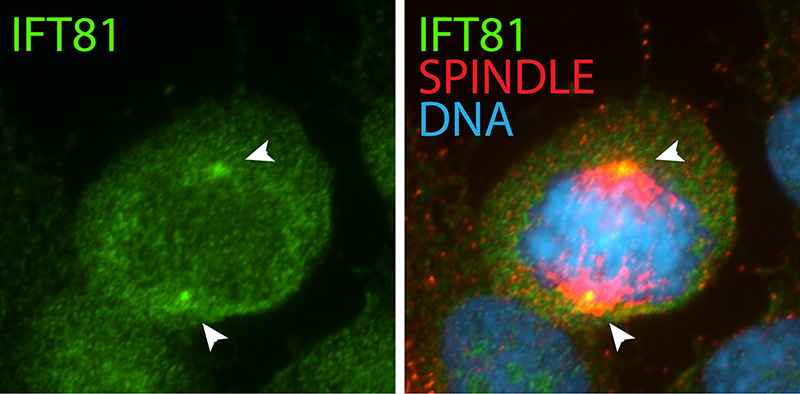
IF result (localization to the spindle poles) of anti-IFT81 (Catalog No:111673, 1:50) with metaphase hTERT-RPE1 cells (MeOH fixed) byDr. Moshe Kim.

Immunofluorescent images of MDCK cells stained with IFT81 rabbit pAb (Catalog No:111673) and acetylated tubulin mouse mAb (Catalog No:107557) at dilution of 1:50, further stained with Alexa Fluor 488-congugated AffiniPure Goat Anti-Rabbit IgG(H+L) for IFT81, and Rhodamine-Goat anti-rabbit IgG for Catalog No:107557.
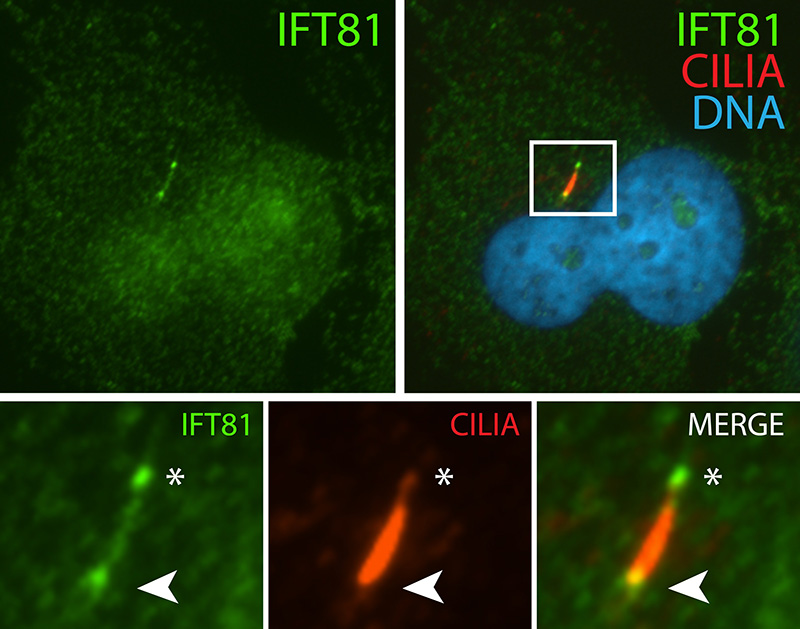
IF result (the base and tip of cilia) of anti-IFT81 (Catalog No:111673, 1:50) with serum-starved hTERT-RPE1 (PFA fixed) by Dr. Moshe Kim.
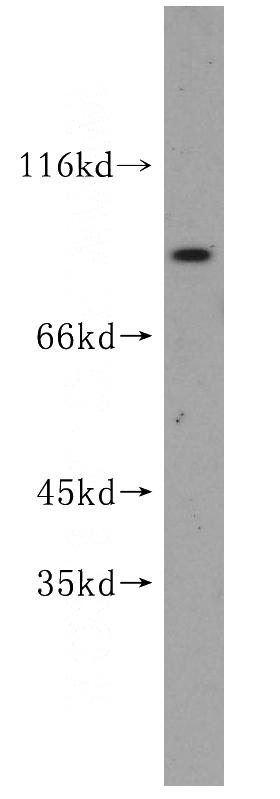
human brain tissue were subjected to SDS PAGE followed by western blot with Catalog No:111673(IFT81 antibody) at dilution of 1:600
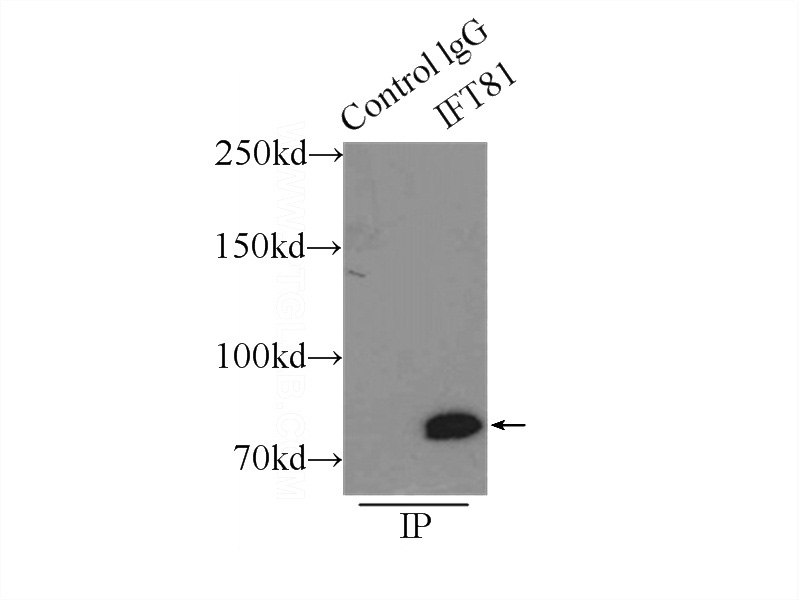
IP Result of anti-IFT81 (IP:Catalog No:111673, 3ug; Detection:Catalog No:111673 1:500) with mouse brain tissue lysate 7500ug.
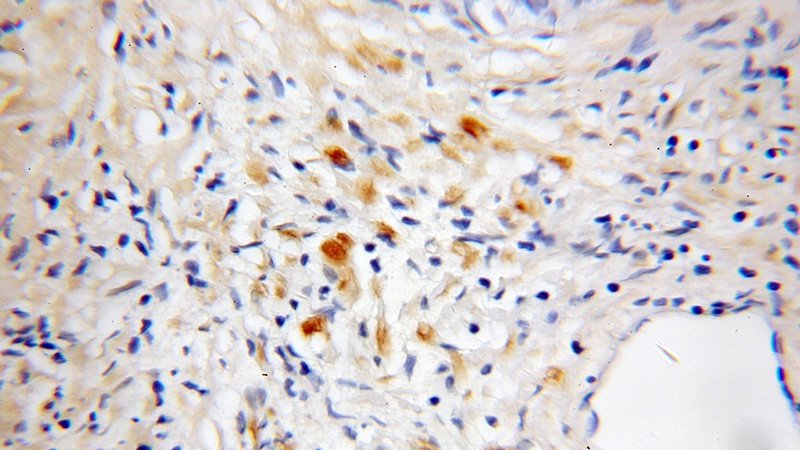
Immunohistochemical of paraffin-embedded human prostate cancer using Catalog No:111673(IFT81 antibody) at dilution of 1:50 (under 10x lens)
-
Background
Intraflagellar transport (IFT), mediated by molecular motors and IFT particles, is an important transport process that occurs in the cilium and has been shown to be essential for the assembly and maintenance of cilia and flagella in many organisms. IFT particles are multi-subunit complexes of proteins that functions to move non-membrane-bound particles from the cell body to the tip of cilium or flagellum, then return them to the cell body. Transport towards the ciliary tip is regulated by the IFT complex B (IFT-B), consisting of at least 15 IFT proteins, in association with kinesin motors, whereas transport from the ciliary tip back to the base is executed by a dynein motor in association with the IFT complex A (IFT-A), currently known to be composed of six IFT proteins. IFT81 is a subunit of IFT complex B.It may play a role in development of the testis and spermatogenesis.
-
References
- Zhang Q, Seo S, Bugge K, Stone EM, Sheffield VC. BBS proteins interact genetically with the IFT pathway to influence SHH-related phenotypes. Human molecular genetics. 21(9):1945-53. 2012.
- He M, Subramanian R, Bangs F. The kinesin-4 protein Kif7 regulates mammalian Hedgehog signalling by organizing the cilium tip compartment. Nature cell biology. 16(7):663-72. 2014.
- Perrault I, Halbritter J, Porath JD. IFT81, encoding an IFT-B core protein, as a very rare cause of a ciliopathy phenotype. Journal of medical genetics. 52(10):657-65. 2015.
- Raman M, Sergeev M, Garnaas M. Systematic proteomics of the VCP-UBXD adaptor network identifies a role for UBXN10 in regulating ciliogenesis. Nature cell biology. 17(10):1356-69. 2015.
Related Products / Services
Please note: All products are "FOR RESEARCH USE ONLY AND ARE NOT INTENDED FOR DIAGNOSTIC OR THERAPEUTIC USE"
